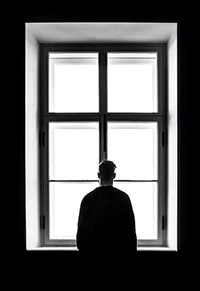"How long, O Lord, how long?" is the opening refrain of many Psalms. This is the heart cry of lament. We've been exploring the steps to racial reconciliation using the helpful acronym GAPS, and today we're looking at the P, which stands for Pray. Prayer is at the core of racial reconciliation, and the first type of prayer we'll consider is the prayer of lament.
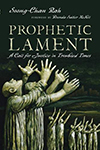 What is lament? The most well-known lament is the book of Lamentations, which was a response to the suffering of the people of Jerusalem after their city had been destroyed and most of its inhabitants had been taken away into exile. In his commentary on Lamentations, Prophetic Lament, Dr. Soong-Chan Rah outlines many facets of lament. He writes that lament engages God in the context of pain and trouble and seeks a response from him to human suffering. Lament cries out for justice against existing injustice and acknowledges that God is ultimately in control. Lament tells the truth about painful history but also envisions the potential of God's renewal and restoration. Latasha Morrison writes, "The act of lament reconnects us with God and leads us to hope and redemption." In addition to the book of Lamentations, over a third of the Psalms incorporate lament. Lament is a core practice in the Bible, both individually and in community, but somehow, in the white American church, we have neglected this vital spiritual practice.
What is lament? The most well-known lament is the book of Lamentations, which was a response to the suffering of the people of Jerusalem after their city had been destroyed and most of its inhabitants had been taken away into exile. In his commentary on Lamentations, Prophetic Lament, Dr. Soong-Chan Rah outlines many facets of lament. He writes that lament engages God in the context of pain and trouble and seeks a response from him to human suffering. Lament cries out for justice against existing injustice and acknowledges that God is ultimately in control. Lament tells the truth about painful history but also envisions the potential of God's renewal and restoration. Latasha Morrison writes, "The act of lament reconnects us with God and leads us to hope and redemption." In addition to the book of Lamentations, over a third of the Psalms incorporate lament. Lament is a core practice in the Bible, both individually and in community, but somehow, in the white American church, we have neglected this vital spiritual practice.
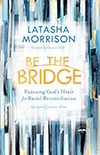 Have you ever found yourself in a state of grief, but rather than mourning with you, others try to cheer you up? I recently found myself on the wrong end of this dynamic. Covid has disrupted our lives in serious ways. One afternoon, my daughter was feeling despair over not being able to go to school or see her friends with no end in sight. I immediately tried to cheer her up, telling her how lucky she was to live in a time when technology allowed her to still do both of those things, even if it was on a computer. She did not appreciate my input. Later that evening, I participated in a discussion of Be the Bridge: Pursuing God's Heart for Racial Reconciliation, and we were talking about the chapter on lament. As we shared, I realized that my daughter had been lamenting, and instead of empathizing, I had shut her down.
Have you ever found yourself in a state of grief, but rather than mourning with you, others try to cheer you up? I recently found myself on the wrong end of this dynamic. Covid has disrupted our lives in serious ways. One afternoon, my daughter was feeling despair over not being able to go to school or see her friends with no end in sight. I immediately tried to cheer her up, telling her how lucky she was to live in a time when technology allowed her to still do both of those things, even if it was on a computer. She did not appreciate my input. Later that evening, I participated in a discussion of Be the Bridge: Pursuing God's Heart for Racial Reconciliation, and we were talking about the chapter on lament. As we shared, I realized that my daughter had been lamenting, and instead of empathizing, I had shut her down.
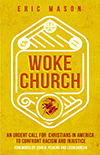 In Romans 12:15-16, Paul tells us to "weep with those who weep. Live in harmony with one another." Is Paul suggesting that unity depends on our ability to mourn with our brothers and sisters? In Woke Church, Eric Mason writes, "We have to learn not to fix people real quick when they begin sharing their hearts and their hurts. If God can listen, so can we. When the realities of a fallen world hit us, we need room to worship the Lord in honest expressions of unedited grief." When we lament in community, we "bear each other's burdens" (Galatians 6:2). And when we are confronted with racial injustice, lament allows us to take that pain to God.
In Romans 12:15-16, Paul tells us to "weep with those who weep. Live in harmony with one another." Is Paul suggesting that unity depends on our ability to mourn with our brothers and sisters? In Woke Church, Eric Mason writes, "We have to learn not to fix people real quick when they begin sharing their hearts and their hurts. If God can listen, so can we. When the realities of a fallen world hit us, we need room to worship the Lord in honest expressions of unedited grief." When we lament in community, we "bear each other's burdens" (Galatians 6:2). And when we are confronted with racial injustice, lament allows us to take that pain to God.
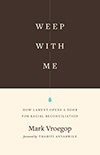 Since many of us have not been in the practice of lamenting, we may not be sure how to do it. In his book, Weep with Me: How Lament Opens a Door for Racial Reconciliation, author Mark Vroegop provides a helpful outline. He lays out four steps of lament commonly found in the Psalms. Follow the links to Psalm 94 to see what these steps look like in practice.
Since many of us have not been in the practice of lamenting, we may not be sure how to do it. In his book, Weep with Me: How Lament Opens a Door for Racial Reconciliation, author Mark Vroegop provides a helpful outline. He lays out four steps of lament commonly found in the Psalms. Follow the links to Psalm 94 to see what these steps look like in practice.
- Turn – choose to talk to God about our pain (vs. 1-2)
- Complain – candidly pray about the struggles, questions, and disappointments (vs. 3-7)
- Ask – boldly call upon God to be true to his promises (vs. 9-19)
- Trust – reaffirm what we believe about God (vs. 22-23)
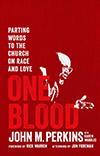 Lament is a spiritual practice that we can apply whenever we are experiencing suffering or grief, but it is a particularly important practice in the pursuit of racial reconciliation. It allows us to take the brokenness of racial injustice to God and seek his intervention. Lament will also lead us into the next phase of prayer: confession. John Perkins writes in One Blood, "Lament can be powerful. But it falls short of the goal of biblical reconciliation if it doesn't also encourage confession. Confession draws the issue closer to home and helps each of us to account for individual responsibility." We'll dig deeper into confession next time.
Lament is a spiritual practice that we can apply whenever we are experiencing suffering or grief, but it is a particularly important practice in the pursuit of racial reconciliation. It allows us to take the brokenness of racial injustice to God and seek his intervention. Lament will also lead us into the next phase of prayer: confession. John Perkins writes in One Blood, "Lament can be powerful. But it falls short of the goal of biblical reconciliation if it doesn't also encourage confession. Confession draws the issue closer to home and helps each of us to account for individual responsibility." We'll dig deeper into confession next time.
Photo by Sasha Freemind on Unsplash

